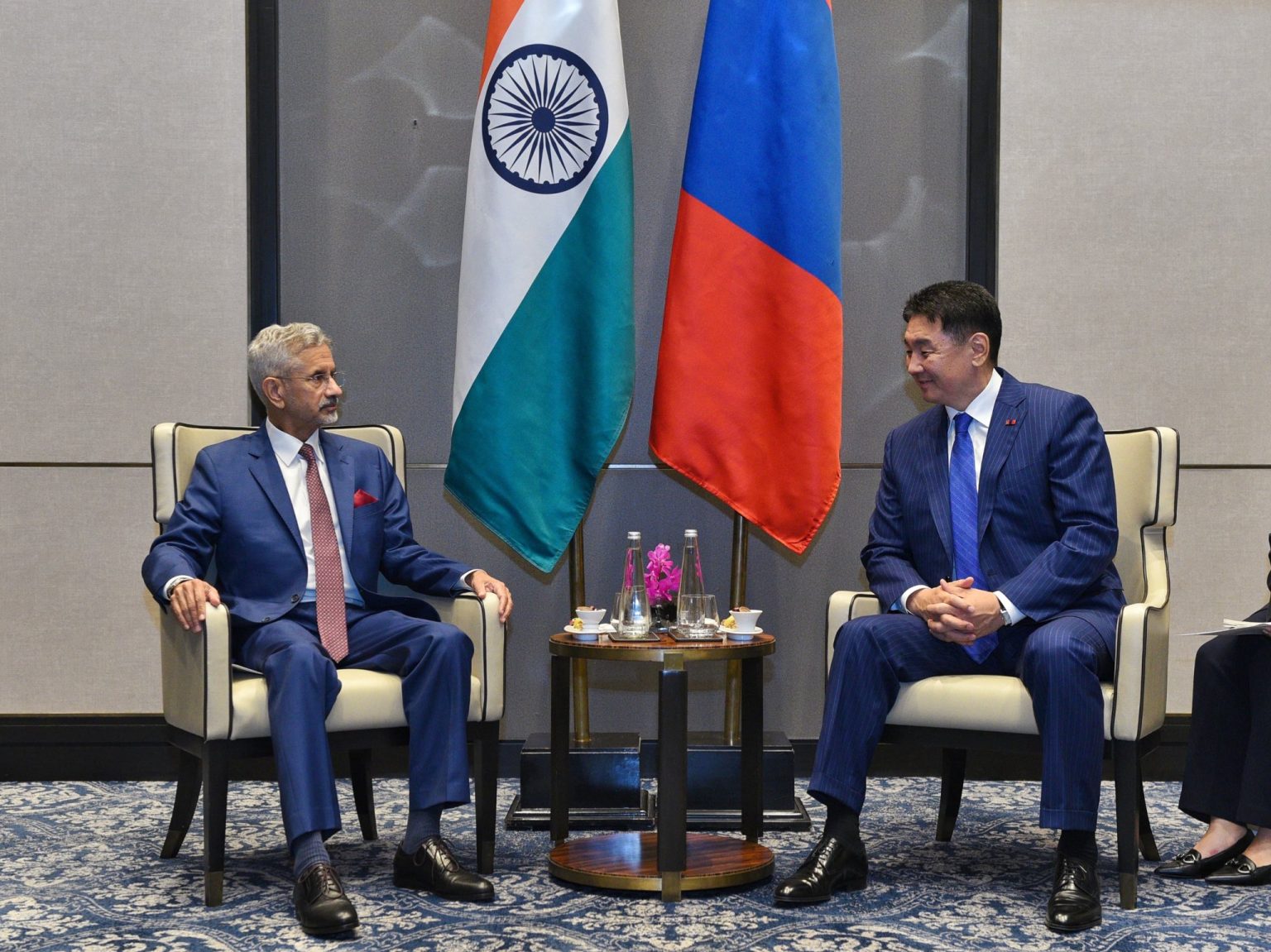EAM Jaishankar Meets Mongolian President Ukhnaa, Highlights Strategic Partnership and Spiritual Ties

EAM Jaishankar Meets Mongolian President Khurelsukh Ukhnaa: Deepening Strategic and Spiritual Ties
Introduction
External Affairs Minister Dr. S. Jaishankar met with President of Mongolia Khurelsukh Ukhnaa in New Delhi today, marking a significant moment in India–Mongolia diplomatic engagement. The meeting came ahead of the Mongolian President’s formal talks with Prime Minister Narendra Modi, as part of his four-day State visit to India.Dr. Jaishankar highlighted the enduring nature of the India–Mongolia strategic partnership, rooted in shared spiritual heritage, Buddhist cultural links, and a mutual commitment to the Global South’s development agenda.
I. Key Highlights of the Meeting
- Strengthening Strategic Partnership:
- Both sides reaffirmed their commitment to deepen cooperation in areas such as defence, energy security, information technology, education, and infrastructure development.
- The discussions reviewed progress on major projects, including the India-assisted oil refinery in Dornogobi, Mongolia’s first such refinery.
- Spiritual and Cultural Ties:
- Dr. Jaishankar emphasized the “spiritual neighbourhood” shared by India and Mongolia, rooted in centuries-old Buddhist connections.
- President Ukhnaa acknowledged India’s role in supporting Buddhist scholarship, heritage preservation, and cultural exchanges between the two nations.
- Global South Solidarity:
- Both leaders underscored the importance of South–South cooperation and collaboration on global platforms such as the United Nations, Shanghai Cooperation Organisation (SCO), and the International Solar Alliance (ISA).
- They reaffirmed a shared commitment to promoting a rules-based international order, sustainable development, and climate resilience.
- Dr. Jaishankar’s Statement:
- In a social media post following the meeting, Dr. Jaishankar expressed appreciation for President Ukhnaa’s “warm sentiments on advancing the strategic partnership as spiritual neighbours and Global South partners.”
- He added that the upcoming talks between President Khurelsukh and Prime Minister Modi would “chart a forward-looking course for the next decade of friendship.”
II. Background: India–Mongolia Relations
1. Diplomatic Milestones:
- India and Mongolia established diplomatic relations in 1955, with India being the first country outside the socialist bloc to do so.
- The partnership was elevated to a Strategic Partnership in 2015 during Prime Minister Modi’s historic visit to Ulaanbaatar — the first-ever by an Indian Prime Minister.
2. Strategic and Economic Cooperation:
- Energy Security: The India-assisted Mongolia Refinery Project, financed through a USD 1.2 billion Line of Credit, represents a cornerstone of bilateral cooperation.
- Defence Cooperation: The annual Nomadic Elephant joint military exercise strengthens defence and counterterrorism collaboration.
- Trade and Investment: India supports Mongolia’s economic diversification through IT, pharmaceuticals, education, and renewable energy sectors.
3. Spiritual Linkages:
- Buddhism, which spread to Mongolia from India through Tibet in the 13th century, forms the civilisational foundation of bilateral ties.
- India’s support in establishing the Atal Bihari Vajpayee Centre for Excellence in Information Technology and Communication in Ulaanbaatar symbolizes the blending of spiritual and technological cooperation.
III. Significance of the Meeting
- Reinforcing High-Level Political Engagement:
- The meeting demonstrates continuity in India’s Act East and Connect Central Asia policies, strengthening India’s outreach in the Indo-Pacific and Eurasian regions.
- Boost to Developmental Diplomacy:
- India’s development assistance aligns with Mongolia’s priorities in infrastructure, capacity building, and sustainable energy, thereby enhancing goodwill and mutual trust.
- Cultural Diplomacy and Soft Power:
- India’s spiritual ties with Mongolia act as a powerful tool of soft power diplomacy, reinforcing people-to-people connections.
- Regional and Strategic Implications:
- Strengthening ties with Mongolia enhances India’s strategic presence in Northeast and Central Asia, providing a counterbalance to regional influences and fostering cooperation in multilateral forums.
IV. Analytical Perspective
India’s outreach to Mongolia reflects a multi-dimensional approach — combining civilisational diplomacy, strategic engagement, and economic cooperation. By framing Mongolia as both a “spiritual neighbour” and a “strategic partner”, India underscores the unique blend of history and modern geopolitics in its foreign policy.This partnership also strengthens India’s continental outreach beyond South Asia, positioning it as a credible stakeholder in Eurasia’s evolving security and economic architecture.Moreover, the collaboration embodies the Global South ethos, where developmental and cultural partnerships coexist with strategic and technological cooperation.
Conclusion
The meeting between EAM Dr. S. Jaishankar and Mongolian President Khurelsukh Ukhnaa marks another milestone in India–Mongolia relations — a partnership that stands at the intersection of spiritual kinship and strategic alignment.As both nations navigate global challenges and opportunities, the vision set forth in this visit will likely guide the next decade of cooperation, reinforcing India’s position as a trusted friend, development partner, and cultural ally of Mongolia.
Updated - October 13, 2025 10:17 PM | News On Air